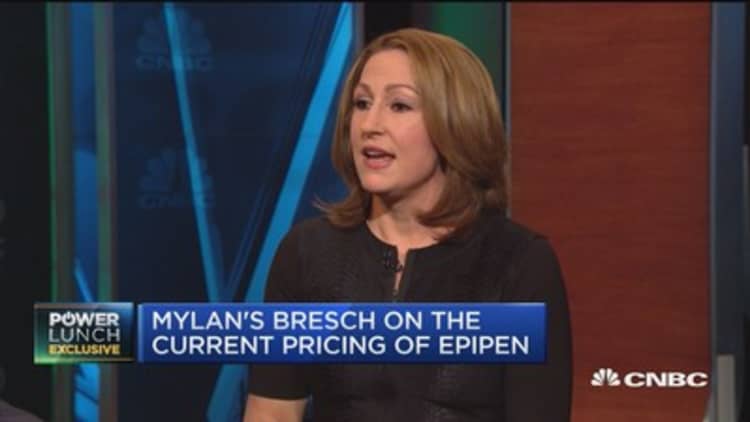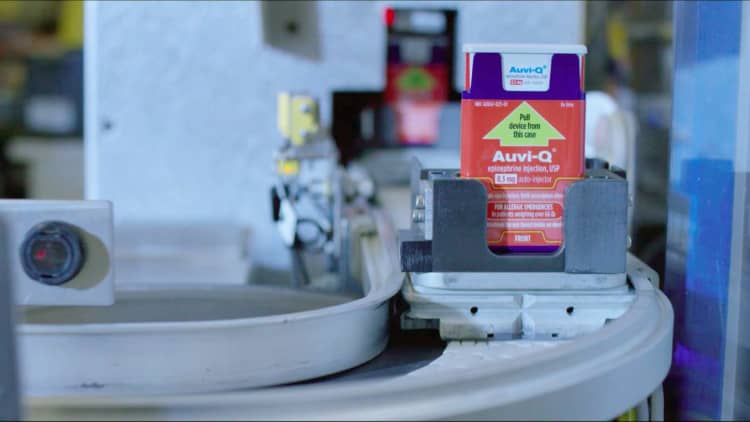Prescriptions for competitors to Mylan's pricey brand-name EpiPen anti-allergy device increased sharply in the first two months of 2017, as customers both sought and were steered toward less-expensive alternatives, new data shows.
Since the end of December, the number of prescriptions for EpiPen competitors more than quadrupled, according to an analysis of more than 1,400 medical providers nationwide. The analysis was conducted by Athenainsight, a division of Athenahealth, the cloud-based record-keeping and medical billing company.

In December, just 5.3 percent of epinephrine auto-injector prescriptions among those providers were for EpiPen alternatives, Athenainsight found.
But that increased to 14.8 percent of all prescriptions in January.
And that rate nearly had doubled by the end of February, when a whopping 28.9 percent of the prescriptions were for non-EpiPen devices, Athenainsight said.
Source: AthenaResearch
The dramatic jump in prescriptions reflected a recent increase in the non-EpiPen options available to buyers of anti-allergy devices — including Mylan's own generic version. It also came after decisions by major insurer Cigna to no longer carry the brand-name version of EpiPen, and by big pharmacy chain CVS to slash the price of a competing product.
EpiPen long has been the dominant product in the anti-allergy auto-injector category. The device is used to deliver an emergency dose of epinephrine, a drug that counteracts the sometimes fatal allergic reaction anaphylaxis.
Mylan's dominant position in the market was cemented in late 2015 when Sanofi recalled the competing product Auvi-Q — which had only been on sale in the United States since 2013 — after problems were identified in its delivery of the correct dosage of the drug.
At the start of 2016, EpiPen was getting more than 95 percent of the prescriptions, according to Athenainsight, and it continued hovering around that rate up to the end of the summer of 2016.

That's when a controversy erupted over Mylan's pricing of EpiPen. Consumers, outraged that they were faced with a retail sticker price of $600 for a two-pack of EpiPens, began complaining online, drawing the attention of the news media and elected officials. It soon became widely known that Mylan had increased the price of EpiPen by 500 percent in recent years.
Mylan, stung by the reaction, responded by expanding its customer-assistance program, which slashed the price of EpiPen to $300 for many consumers.
But effects of the controversy were seen in September, when 7.8 percent of prescriptions were for EpiPen competitors, up from just 4.9 percent the month before, Athenainsight found.
In October, 7 percent of prescriptions were for non-EpiPen devices.
EpiPen's share of prescriptions grew in November and December. But in January, the share of prescriptions by competitors started increasing dramatically.
The spike followed several events.
First, Mylan introduced a generic version of EpiPen in December. That product — identical to its brand-name sibling — sells for around $300, or half of the list price of brand-name EpiPens.
Second, on Jan. 11, Cigna announced that it would no longer cover the brand-name EpiPen, but instead would cover the cheaper generic version from Mylan.
A day later, pharmacy giant CVS Health said it would sell a two-pack of generic Adrenaclick auto-injectors for just $109.99, almost half of what it had sold those EpiPen competitors for previously.
And then, in mid-February, drugmaker Kaleo reintroduced Auvi-Q to the U.S. market. Kaleo, which is privately held, had previously sold Auvi-Q in partnership with Sanofi.
Auvi-Q has a byzantine pricing structure. People who pay cash at the pharmacy counter have to pay around $360 for a two-pack. Families with annual incomes of less than $100,000 will get the package for free. But health insurers are being charged $4,500 for the devices, with insured customers paying $0 out of pocket.
All four of those developments could be having an impact on Mylan's revenue for EpiPen, even accounting for the fact that its own generic version is probably contributing to the rise in prescriptions for alternative products.
"The generic's [EpiPen] cheaper than the brand name," noted Anna Zink, senior data engineer, athenaResearch, an Athenahealth division.
Zink told CNBC that the data collected by Athenainsight from prescribing doctors did not indicate what percentage of alternative prescriptions to EpiPen came from Mylan's generic product.


